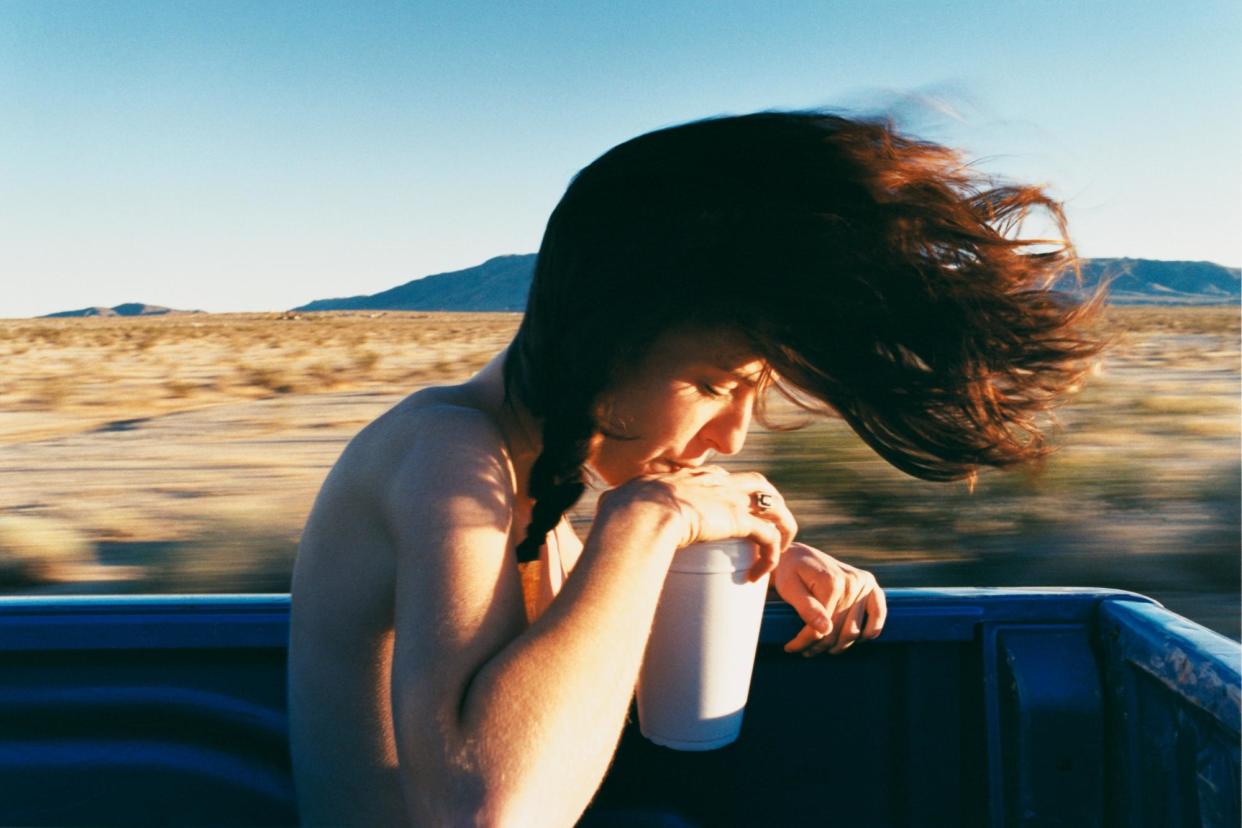‘I want to be where the energy’s at’: photographer Ryan McGinley on youth culture, creativity and being collected by Elton John

One night in 2005, during one of his epic group road trips across America, the photographer Ryan McGinley trained his camera on a naked man and woman on a van roof in California. “We were looking at shooting stars and I was trying to do some long exposures to get something cool,” says McGinley, “but I didn’t have the technical capabilities so I just did a point-and-shoot.”
The attempt to capture the stars may have failed, but the photograph itself, suggesting the tenderness and vulnerability of lovers against the vast emptiness of space, did not. After the trip, McGinley put together a zine of recent images to share with friends and people he knew, including Elton John, who had developed an interest in the photographer’s work. “Elton said: ‘Thank you’, then five minutes later he gave it back to me. I was like: ‘What?’” McGinley recalls, laughing. “It turns out he thought the zine was a catalogue to buy photos. That photo [of the night sky] was circled and he was like: ‘I want this one.’”
It’s one of many works by McGinley that the musician, who has been collecting photography since the early 1990s, has acquired over the years. They first met in 2003 when McGinley, then one of the hottest young artists in New York, known for documenting the joyous excesses of the city’s gay scene, had a solo exhibition at the Whitney entitled The Kids Are Alright. The show lit a fuse under McGinley’s career and won him his most deep-pocketed fan. “Elton just came to the show and looked around, and said: ‘I’ll take that, that, that and that.’”
Being in California, out in the desert, it felt as if I was in Kerouac’s On the Road – such a special time
They’ve remained friends ever since. As well as buying his works, allowing McGinley to undertake more ambitious projects, Elton commissioned him to shoot the cover for his 2006 album, The Captain & the Kid, and offered support when McGinley went sober nearly 13 years ago. Now, Elton and his husband, David Furnish, are including six of McGinley’s works in a new exhibition of their vast photography collection, Fragile Beauty, which opens this month at London’s V&A.
Of the six photographs, all taken between 1999 and 2005, perhaps the most striking shows McGinley and his then boyfriend having sex in his East Village bedroom, watched over by scores of Polaroid portraits. Its extraordinary candidness is typical of the photographer’s work, distinguished by a deep and often playful intimacy with his subjects.
In the corner hangs a string of rosary beads, a reminder of McGinley’s religious upbringing in New Jersey, where he was the youngest of eight in a conservative Catholic family. Moving to New York to study at Parsons School of Design in the mid-90s was a liberation for the artist, who came out as gay the year before Having Sex (Polaroids) was taken, and much of his early work was about “discovering my queerness”, he says.
After the Whitney show in 2003, McGinley began to move beyond the streets of New York. “I just knew that I had to pivot or else I’d be a one-trick pony,” he says. His response was to organise month-long road trips across America with friends, usually in groups of 10, so that he could photograph bodies in nature. Dakota (Hair), which features in the V&A exhibition, was taken on the first of these trips: it shows a woman in the back of a pickup truck sipping from a cup while the wind whips at her hair. “We never made it out of New Jersey when I was younger,” says McGinley, “so being in California, out in the desert, it felt as if I was in Kerouac’s On the Road. It was such a special time.”
McGinley still does road trips, but on a less epic scale: he might go to Colorado or California for a couple of weeks to zero in on a particular landscape element – rocks or trees covered in Spanish moss or sand. (He photographed Brad Pitt in various US national parks for a GQ cover feature in 2017.) Over the past decade, in contrast to the raw spontaneity of his early work, McGinley has been doing more composed studio portraits, photographing artists and musicians for commercial and editorial, as well as fine-art projects. A monograph of his studio work, entitled Yearbook, will be published by Rizzoli later this year.
Now 46, McGinley remains fascinated by young people. As well as documenting youthful bodies, he offers apprenticeships and guidance to up-and-coming photographers – he mentions Quil Lemons, Sandy Kim and Marie Tomanova as three current favourites. For an artist who thrives off youthful energy, it’s a mutually beneficial relationship (and one that mirrors his own with Elton John). “I learn more from the kids now than I did when I was young,” he says. “I always feel like, when someone’s asking me for advice, I’m getting as much information from them – about what their thoughts are politically, or what’s new that I might not be up on, or just where the energy’s at – I always want to be where the energy’s at.”
Fragile Beauty: Photographs from the Sir Elton John and David Furnish Collection is at the V&A, London SW7, 18 May–5 January 2025

 Yahoo News
Yahoo News 
